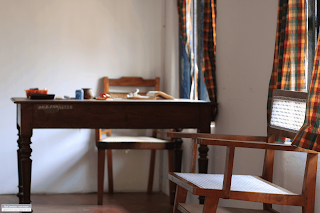 Just came across this book and have been devouring it. While most travel writing is about the good stuff this one is about travels gone wrong. Just what is it that makes a bad journey? Sometimes it is just bad planning or bizarre incidents. Some of the writers in the book went to a place expecting something bad to happen. Others were caught off guard.
Just came across this book and have been devouring it. While most travel writing is about the good stuff this one is about travels gone wrong. Just what is it that makes a bad journey? Sometimes it is just bad planning or bizarre incidents. Some of the writers in the book went to a place expecting something bad to happen. Others were caught off guard.Traveling in India is always considered to be a luxury. Three journeys we always talk about - your hometown, your honeymoon and a summer getaway you enjoyed. Travelling on work we never consider as travel. It is not fun. In fact for most of us travel is always full of tension. Delayed transport, bad toilets/hotels and of course rude service. This is compounded by the fact that we are bad travelers. Always complaining. Wanting the best service for the least money. Wanting a vehicle even if the walk to the beach is short. Wanting ghar ka khana a thousand miles away from home.
In fact, do Indians really know how to judge a good trip from a bad one?
Every time I travel on a shoot, many of my team members often look at the trip like a chore. They are never interested in the journey or the experience. The only time they enjoy is when they go out for shopping at the local bazaar. The rest of the time its grumble grumble grumble.
I remember the trek to Chandratal six years back. It was tough and we were not prepared for the climb. The crew started all cheerful since the the dhaba we stayed at the night before was not exactly five star - with truck drivers snoring and farting away to moonless night. Anything would be better than that.
The trek itself took us seven hours, twice as long as we were told. But that was because we were not used to the climb. Soon everyone was groaning. One crew member gave up and decided to turn back.
But when we reached the lake in the afternoon, the view took my breath away. The rest of the crew was still in a sore mood. They wanted to return before dark. It almost seemed like they were not interested in the place. Granted the climb was tough, but the sight of the lake should have made anyone forget all that. But not this crew.
Maybe it was not their problem. There might be something in the way I respond to travel. Last year we were traveling in the Sundarbans and the boat ran into a storm. It started to rain and for a couple of hours we could not land because the winds were too strong. All this while I was enjoying the rain, my colleague was sitting in a corner chewing his nails. Later in the night when we were discussing the boat ride he confessed that he had been scared. Me on the other hand with no idea of how to swim never thought of that possibility.
The worst trip for me was a road journey from Bombay to Delhi. It was Diwali time and I could not get any reservations by train or air. 15 years back this road was still a two lane one all through the Bombay-Baroda-Ahmedabad-Udaipur-Jaipur-Delhi stretch. When I got off the last bus, I could no longer feel my back with all the shaking and bumping. Outside ISBT I did not even bargain the auto fare. Just wanted to get home and curl into my bed.
What is the worst trip you can remember?










































 my hands work
my hands work








